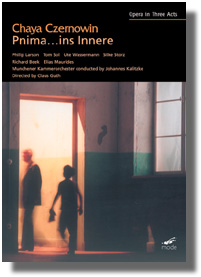|
Chaya Czernowin
Pnima...ins Innere
Opera in 3 Acts
THE OLD MAN: Richard Beek,
Philip Larson & Tom Sol, voices
THE YOUNG BOY: Elias Maurides
Ute Wassermann & Silke Storz, voices
Soloists:
Anthony Burr, clarinet
Rico Gubler, saxophone
Andreas Eberle, trombone
David Shively, singing saw & percussion
Mary Oliver, viola
Frank Cox, violoncello
Experimental Studio of the Heinrich Strobel Stiftung SWR, live electronics
André Richard, Michael Acker, Reinhold Braig, sound direction
Munich Chamber Orchestra with Johannes Kalitzke, conductor
mode DVD 169
This is a work of extreme modernity and complexity, which I found completely baffling seeing and hearing it at its premiere in Munich 2000.
The existence of this filmed recording is to be greatly welcomed, and at our third viewing of Pnima...ins Innere its strange logic began to make sense. Chaya Czernowin (b.1957) sought to convey the isolation between a crazed Holocaust victim and his small grandson across the gulf of the generations to depict the post-war German situation, taking a viewpoint of the children (and here grandchildren) of those who suffered directly, in whatever guise they were cast, all finding it hard or impossible to either or escape the collective horrific experience.
Czernowin opted for a wordless representation, with singers, instruments and electronics to support visual images surrounding a bleak room in which, through three scenes the boy and his grandfather are first close but almost unaware of the other's presence; next he tries but fails to understand his grandfather's 'message'; finally creates his own internalised holocaust.
Rarely, and in this case (as with Pierre Audi's quite difficult production of Rameau's Zoroastre) we advise preliminary viewing of Chaya Czernowin's explanation of her concept to Brian Brandt (the moving spirit behind mode records - good to see him on screen !).
As with the amazing Earle Brown DVD [mode 179] the documentary extra here is a model of unforced, unedited exposition, and it certainly gave me a new and helpful orientation towards an 'opera' which made an enormous impact at the Munich Biennale.
Peter Grahame Woolf
|



